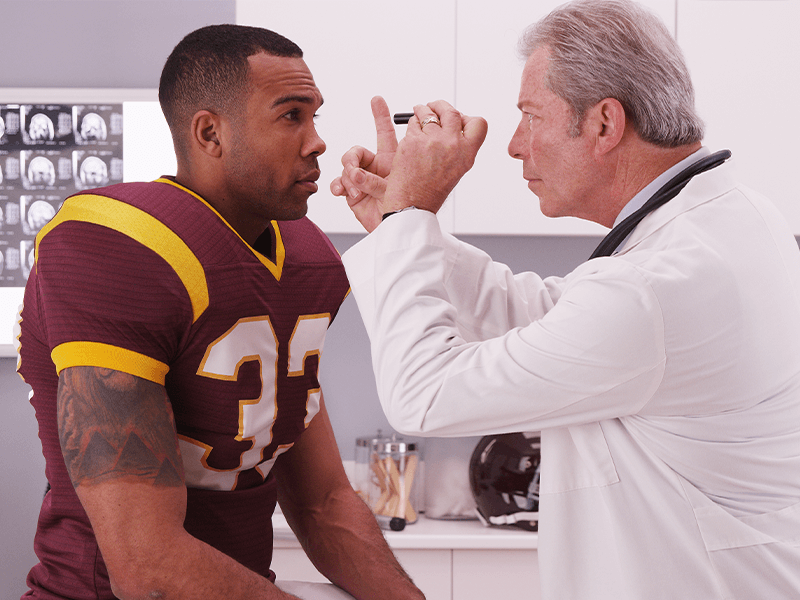Search
Find a Physician
Blog
Mar 7, 2023
A sports medicine physician is a doctor, not a surgeon, specializing in the diagnosis and non-operative treatment of sports injuries. These doctors start their careers in internal medicine, family medicine, pediatrics, or emergency medicine and then receive additional training to become a sport medicine doctor.
As such, they know the musculoskeletal system better than most. Sports medicine doctors are trained in the latest non-operative diagnostic and treatment modalities, are aware of the many sport-specific training regiments that impact recovery, and they know how to return athletes to sports after injury safely and quickly. Lastly, these doctors can refer patients, who fail non-operative modalities, to orthopedic surgeons for definitive surgical care when necessary.
With all of this in mind and without further ado, here’s what you need to know about sports medicine doctors and what they do.
The best way to explain the concept of a sports doctor is to explain what they do. While they have many different duties, the bulk of their work comes down to the following:
In other words, aside from being a medical professional, a sports medicine physician can have a vital role in the athlete’s career. They can advise and assist healthy athletes and facilitate the recovery of injured ones.
Moreover, as the field constantly evolves, a specialist will have an easier time tracking innovations in sports medicine. Keeping up with innovations in the area is one of the main reasons why specializations exist.
Both orthopedics and sports doctors heavily focus on musculoskeletal conditions; however, sports physicians have a broader scope. This scope usually goes beyond orthopedics. In terms of musculoskeletal conditions, orthopedic specialists have a deeper knowledge and skill base on a more narrow field of focus
Sports doctors address non-surgical injuries and conditions quite commonly. So, some might argue that, on average, a sports medicine physician has a more holistic approach within the scope of their work.
Also, while this is not a rule, most of the time, sports medicine doctors will treat athletes; but they can also treat patients who wish to pursue non-operative treatments for chronic conditions, such as arthritis.
The main confusion probably comes from orthopedic sports medicine. This is a sub-specialization in orthopedic surgery that tries to envelop both concepts of medicine and surgery. These are trained orthopedic surgeons with unique skill set.
Another confusion is between sports medicine physicians and physical therapists. Physical therapists don’t attend medical school. This means that they don’t diagnose injuries. They treat them in a way that a physician (sometimes a sports medicine physician) has prescribed.
Make no mistake; therapists are crucial to recovery and athletes’ ability to return to game-ready functionality. This is achieved through stretches, electrostimulation, and exercise therapy.
Now, it’s easier to explain what sports doctors are once we understand the conditions they are commonly dealing with. Some of the most common sports injuries are:
More severe injuries are often sent to the orthopedic surgeon initially.
Most of these injuries are caused by overuse, which is why a sports medicine specialist must also assume an advisory role. Educating athletes and coordinating with trainers can drastically reduce the number of overuse injuries. This is why the role of a sports medicine physician requires proactivity.
Many places employ sports medicine doctors. For instance, you may find them in hospitals, clinics, private practices, and rehabilitation centers. Colleges and universities also have their own sports medicine physicians.
However, those serious about their athletic endeavors might seek a specialized sports medicine center. Here, their case will be treated more holistically.
Lastly, as we’ve mentioned, all the major sports teams have sports doctors of their own. Keep in mind that, for these doctors, this is not always a full-time job. Chances are that they work in a hospital or a medical center and respond to them on-call.
Lastly, professional sports organizations also employ quite a few sports doctors.
The simplest answer to this question is – whenever you have a sports-related injury. However, there are other reasons to visit a sports doctor.
Some people do this to improve their overall fitness level safely and effectively. This is especially important for professional athletes who do everything to gain a competitive edge. Overtraining and hurting themselves is a serious risk that could set them back considerably.
Even people who are not professional athletes can benefit from talking to a sports doctor. A checkup on their fitness and tips on improving it can go a long way.
The landscape of modern sports would be entirely different without a sports medicine physician. Just consider that, according to some estimates, about 1,500 per 10,000 athletes are injured at any moment. The effort they put into the care, recovery, and education of athletes makes a world of difference. Because the field is progressing rapidly, it takes a specialist to keep up with all the changes. Plus, when your career is on the line, you want the best.
So, get back in the game and visit one of our sports medicine physicians today.
This article was reviewed and approved by an orthopedic surgeon as we place a high premium on accuracy for our patients and potential patients.